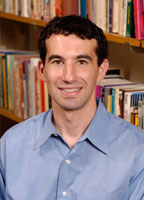非常抱歉,
你要访问的页面不存在,
非常抱歉,
你要访问的页面不存在,
非常抱歉,
你要访问的页面不存在,
验证码:

职称:Associate Professor of Science, Technology, and Society
所属学校:Carnegie Mellon University
所属院系:history
所属专业:History, General
联系方式:aronson@andrew.cmu.edu
Jay Aronson’s research and teaching focus on the interactions of science, technology, law, and human rights in criminal justice, post-conflict, and post-disaster contexts. His first book, entitled Genetic Witness: Science, Law, and Controversy in the Making of DNA Profiling (Rutgers University Press, 2007), examines the development of forensic DNA analysis in the American legal system. He also completed a series of articles that investigates the impact of recent advances in DNA identification on notions of culpability, finality, and justice in American criminal jurisprudence. Dr. Aronson is currently engaged in a long-term study of the ethical, political, and social dimensions of post-conflict and post-disaster DNA identification of the missing and disappeared. This research is funded by an R01 grant from the U.S. National Institutes of Health (NIH). He is also part of a collaborative project the seeks to improve the quality of civilian casualty recording and estimation in times of conflict, which is funded by the U.S. National Science Foundation (NSF). Both of these projects are housed within Carnegie Mellon's Center for Human Rights Science, which Dr. Aronson founded in 2011 in order to encourage the development and application of scientific methods for collecting, analyzing, and communicating human rights information. In addition to his research and teaching activities, Dr. Aronson also directs the undergraduate Ethics, History, and Public Policy major. Working with the amazing students who are part of this program is without a doubt the best part of his job. Dr. Aronson received his Ph.D. in History of Science and Technology from the University of Minnesota and was both a pre- and post-doctoral fellow at Harvard University's John F. Kennedy School of Government.
Jay Aronson’s research and teaching focus on the interactions of science, technology, law, and human rights in criminal justice, post-conflict, and post-disaster contexts. His first book, entitled Genetic Witness: Science, Law, and Controversy in the Making of DNA Profiling (Rutgers University Press, 2007), examines the development of forensic DNA analysis in the American legal system. He also completed a series of articles that investigates the impact of recent advances in DNA identification on notions of culpability, finality, and justice in American criminal jurisprudence. Dr. Aronson is currently engaged in a long-term study of the ethical, political, and social dimensions of post-conflict and post-disaster DNA identification of the missing and disappeared. This research is funded by an R01 grant from the U.S. National Institutes of Health (NIH). He is also part of a collaborative project the seeks to improve the quality of civilian casualty recording and estimation in times of conflict, which is funded by the U.S. National Science Foundation (NSF). Both of these projects are housed within Carnegie Mellon's Center for Human Rights Science, which Dr. Aronson founded in 2011 in order to encourage the development and application of scientific methods for collecting, analyzing, and communicating human rights information. In addition to his research and teaching activities, Dr. Aronson also directs the undergraduate Ethics, History, and Public Policy major. Working with the amazing students who are part of this program is without a doubt the best part of his job. Dr. Aronson received his Ph.D. in History of Science and Technology from the University of Minnesota and was both a pre- and post-doctoral fellow at Harvard University's John F. Kennedy School of Government.